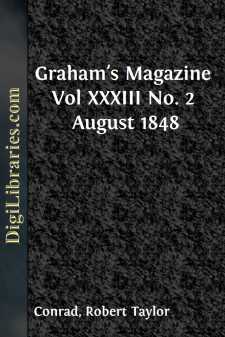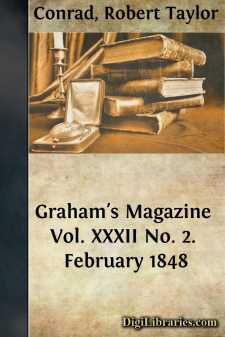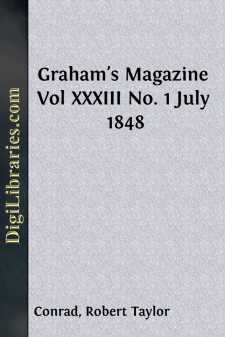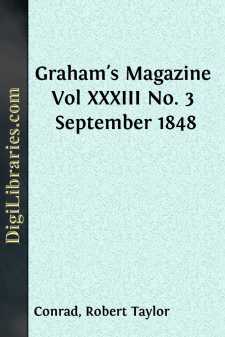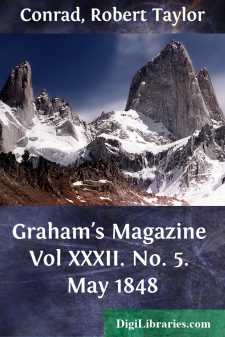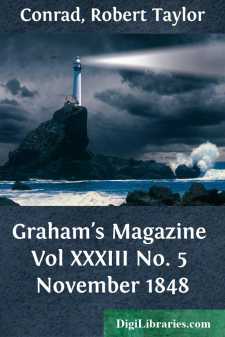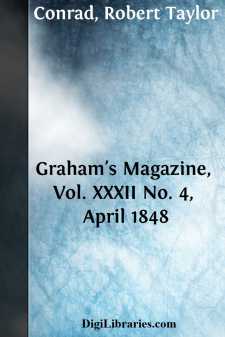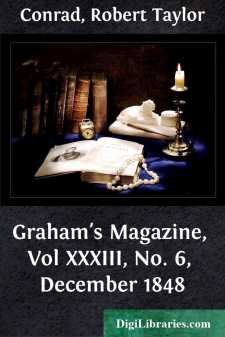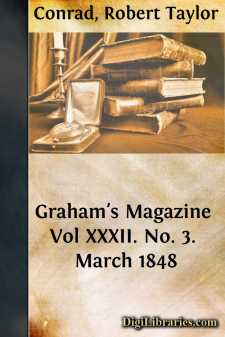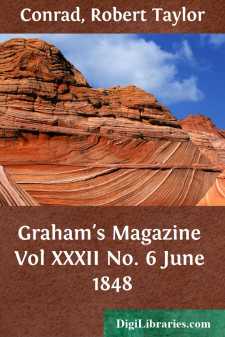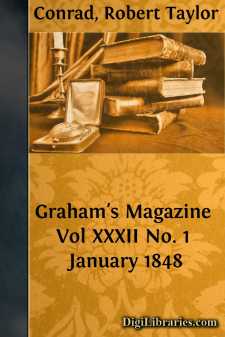Categories
- Antiques & Collectibles 13
- Architecture 36
- Art 48
- Bibles 22
- Biography & Autobiography 813
- Body, Mind & Spirit 142
- Business & Economics 28
- Children's Books 16
- Children's Fiction 13
- Computers 4
- Cooking 94
- Crafts & Hobbies 4
- Drama 346
- Education 46
- Family & Relationships 57
- Fiction 11829
- Games 19
- Gardening 17
- Health & Fitness 34
- History 1377
- House & Home 1
- Humor 147
- Juvenile Fiction 1873
- Juvenile Nonfiction 202
- Language Arts & Disciplines 88
- Law 16
- Literary Collections 686
- Literary Criticism 179
- Mathematics 13
- Medical 41
- Music 40
- Nature 179
- Non-Classifiable 1768
- Performing Arts 7
- Periodicals 1453
- Philosophy 64
- Photography 2
- Poetry 896
- Political Science 203
- Psychology 42
- Reference 154
- Religion 513
- Science 126
- Self-Help 84
- Social Science 81
- Sports & Recreation 34
- Study Aids 3
- Technology & Engineering 59
- Transportation 23
- Travel 463
- True Crime 29
Graham's Magazine Vol XXXIII No. 2 August 1848
Categories:
Description:
Excerpt
This remarkable woman was not only one of the first writers of her country, but she deserves to be ranked with the most celebrated persons of her sex who have lived in any nation or age. Within the last century woman has done more than ever before in investigation, reflection and literary art. On the continent of Europe an Agnesi, a Dacier and a Chastelet have commanded respect by their learning, and a De Stael, a Dudevant and a Bremer have been admired for their genius; in Great Britain the names of More, Burney, Barbauld, Baillie, Somerville, Farrar, Hemans, Edgeworth, Austen, Landon, Norman and Barrett, are familiar in the histories of literature and science; and in our own country we turn with pride to Sedgwick, Child, Beecher, Kirkland, Parkes Smith, Fuller, and others, who in various departments have written so as to deserve as well as receive the general applause; but it may be doubted whether in the long catalogue of those whose works demonstrate and vindicate the intellectual character and position of the sex, there are many names that will shine with a clearer, steadier, and more enduring lustre than that of Maria del Occidente.
Maria Gowen, afterward Mrs. Brooks, upon whom this title was conferred originally I believe by the poet Southey, was descended from a Welsh family that settled in Charlestown, near Boston, sometime before the Revolution. A considerable portion of the liberal fortune of her grandfather was lost by the burning of that city in 1775, and he soon afterward removed to Medford, across the Mystic river, where Maria Gowen was born about the year 1795. Her father was a man of education, and among his intimate friends were several of the professors of Harvard College, whose occasional visits varied the pleasures of a rural life. From this society she derived at an early period a taste for letters and learning. Before the completion of her ninth year she had committed to memory many passages from the best poets; and her conversation excited special wonder by its elegance, variety and wisdom. She grew in beauty, too, as she grew in years, and when her father died, a bankrupt, before she had attained the age of fourteen, she was betrothed to a merchant of Boston, who undertook the completion of her education, and as soon as she quitted the school was married to her. Her early womanhood was passed in commercial affluence; but the loss of several vessels at sea in which her husband was interested was followed by other losses on land, and years were spent in comparitive indigence. In that remarkable book, "Idomen, or the Vale of Yumuri," she says, referring to this period: "Our table had been hospitable, our doors open to many; but to part with our well-garnished dwelling had now become inevitable. We retired, with one servant, to a remote house of meaner dimensions, and were sought no longer by those who had come in our wealth. I looked earnestly around me; the present was cheerless, the future dark and fearful. My parents were dead, my few relatives in distant countries, where they thought perhaps but little of my happiness. Burleigh I had never loved other than as a father and protector; but he had been the benefactor of my fallen family, and to him I owed comfort, education, and every ray of pleasure that had glanced before me in this world. But the sun of his energies was setting, and the faults which had balanced his virtues increased as his fortune declined. He might live through many years of misery, and to be devoted to him was my duty while a spark of his life endured. I strove to nerve my heart for the worst. Still there were moments when fortitude became faint with endurance, and visions of happiness that might have been mine came smiling to my imagination. I wept and prayed in agony."
In this period poetry was resorted to for amusement and consolation. At nineteen she wrote a metrical romance, in seven cantos, but it was never published. It was followed by many shorter lyrical pieces which were printed anonymously; and in 1820, after favorable judgments of it had been expressed by some literary friends, she gave to the public a small volume entitled "Judith, Esther, and other Poems, by a Lover of the Fine Arts." It contained many fine passages, and gave promise of the powers of which the maturity is illustrated by "Zophiël," very much in the style of which is this stanza:
With even step, in mourning garb arrayed,Fair Judith walked, and grandeur marked her air;
Though humble dust, in pious sprinklings laid....


